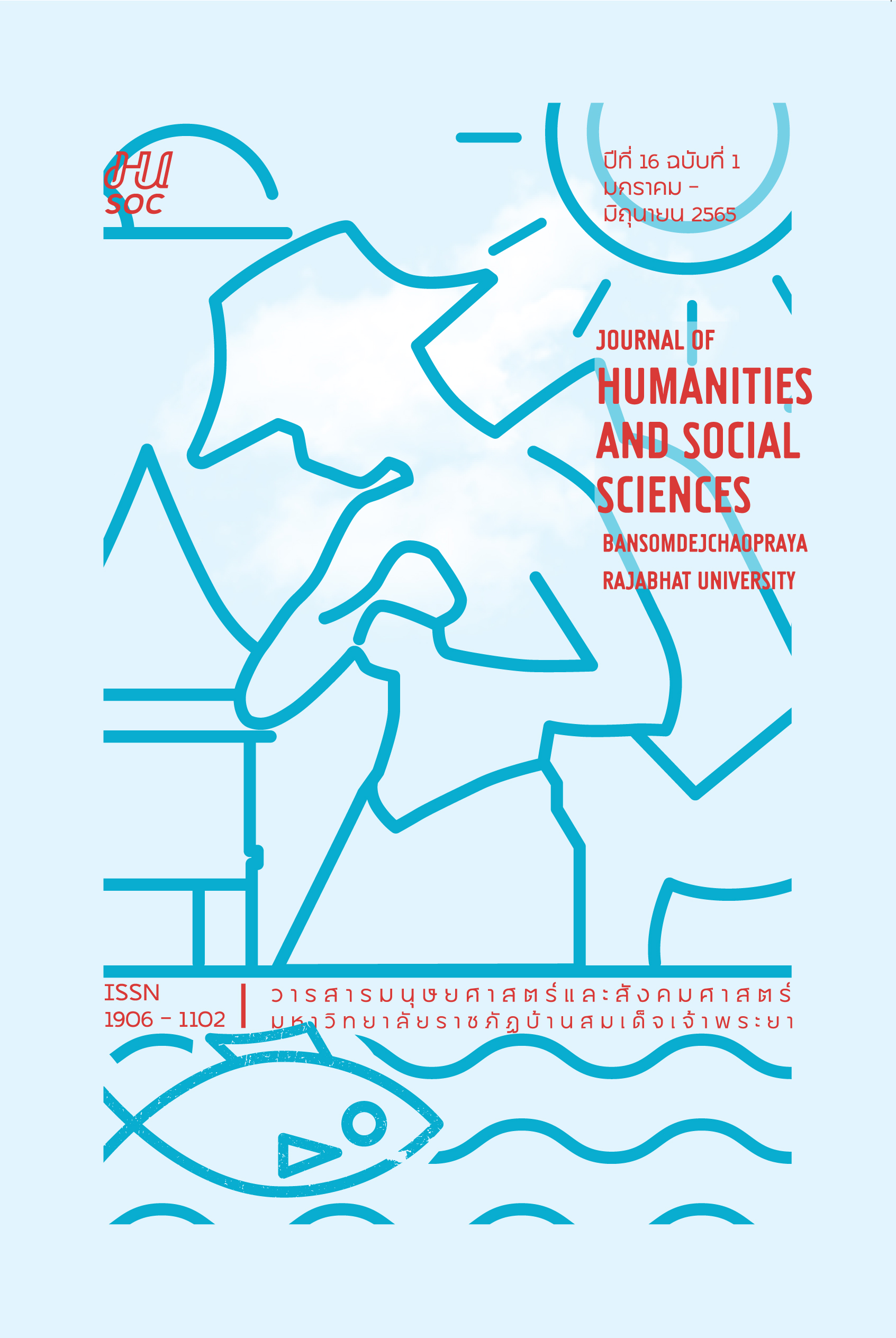The Communication of OTOP Bags’ Identity by the Group of Producers and Entrepreneurs
Keywords:
Identity Communication, Identity of OTOP Bag, Producers and EntrepreneursAbstract
This article is a part of the research title The Communication of Product Identity and the Preference of Millennial Consumers for OTOP Bags.The aim of the article is to provide the study results regarding the way the producer group and entrepreneurs communicate about their OTOP bags identity. The researcher used qualitative research methods as a means of collecting data by conducting documentary research as well as in-depth interviews.The interviews were conducted with two groups of research participants - the group of producers and entrepreneurs,and the other of bag designers from three communities including Rung Mai Pradit Group from Saraburi Province, the silk bag tailor group from Kalasin Province, and the natural dyed fabric transformation group from Sakon Nakhon Province. The results of the study reveal that the communication of OTOP Bags identity consists of three parts. First, the identity of OTOP bags originated from the community context combined with the communitys local identity. Such combination creates the differences among products identity. The consistencies of OTOP bags identity from these three communities are that all of the bags are made from local materials and are environment-friendly of which shape has been designed to be unique and easy to carry. Second,the primary marketing communication techniques that the OTOP bag producers and entrepreneurs used to communicate about their bags identity are organizing special events and creating contents through both online and offline channels including events and content creation. Lastly, the OTOP bag producers and entrepreneurs demand the improvements and supports in several areas. For instance, they would like knowledge on product improvement, a support for exporting their products, and financial and technological support from the government.
References
โกวิท ธารีรัตนาวิบูลย์. (2561). แนวทางการเพิ่มประสิทธิภาพและการแข่งขันในการขายและกระจายสินค้าผ่านระบบอีคอมเมิร์ชของผู้ประกอบการรายย่อยไทยสู่ตลาดโลก. เอกสารประกอบการสอน วิทยาลัยป้องกันราชอาณาจักรหลักสูตรการป้องกันราชอาณาจักร รุ่นที่ 60.
ณฐพล ธรรมสมบัติ. (2557). การสื่อสารแบรนด์เพื่อสร้างอัตลักษณ์ของบุรุษในโฆษณาผลิตภัณฑ์บำรุงผิวหน้าชายกรณีศึกษาแบรนด์นีเวีย. [วิทยานิพนธ์นิเทศศาสตรมหาบัณฑิต สาขาวิชาการสื่อสารเชิงกลยุทธ์ มหาวิทยาลัยกรุงเทพ].
ณัฐวรรณ นาคประกาศ. (2557). ปัจจัยส่วนประสมทางการตลาดที่ส่งผลต่อความพึงพอใจของลูกค้าในการจัดกิจกรรมส่งเสริมการตลาด กรณีศึกษา บริษัท อินเด็กซ์ ครีเอทีฟ วิลเลจ จำกัด (มหาชน). [วิทยานิพนธ์ปริญญาบริหารธุรกิจมหาบัณฑิต มหาวิทยาลัยเนชั่น].
ยุพิน พึ่งภิญโญ. (2551). การสื่อสารการตลาดแบบบูรณาการของร้านอาหารไทยในกรุงโตเกียว. [วิทยานิพนธ์ปริญญานิเทศศาสตรมหาบัณฑิต สาขาวิชาการประชาสัมพันธ์ คณะนิเทศศาสตร์ จุฬาลงกรณ์มหาวิทยาลัย].
สมสุข หินวิมาน. (2554). ทฤษฎีสำนักวัฒนธรรมศึกษา. ใน ประมวลสาระชุดวิชาปรัชญานิเทศศสตร์และทฤษฎีการสื่อสาร (หน่วยที่ 8-15) นนทบุรี: มหาวิทยาลัยสุโขทัยธรรมมาธิราช.
สราวุธ อนันตชาติ. (2549, กรกฎาคม - ธันวาคม). การสื่อสารการตลาดในกระแสโลกาภิวัตน์: สถานภาพและองค์ความรู้ปัจจุบัน. วารสารนิเทศศาสตร์ (จุฬาลงกรณ์มหาวิทยาลัย). 24(1), 69-118.
สุธินี ฉัตรธารากุล. (2557). กลยุทธ์การสื่อสารตราสินค้าและปัจจัยที่ผู้บริโภคใช้ในการตัดสินใจซื้อตราสินค้าแฟชั่นดีไซเนอร์ไทย. [วิทยานิพนธ์นิเทศศาสตรมหาบัณฑิต สาขาวิชานิเทศศาสตร์ คณะนิเทศศาสตร์ จุฬาลงกรณ์มหาวิทยาลัย].
วีระพันธ์ อะนันชัยธวัช. (2561, มกราคม - มีนาคม). การสื่อสารการตลาดผ่านการสร้างสรรค์เรื่องราวโอทอปกลุ่มผ้าจังหวัดเชียงใหม่. วารสารวิชาการมหาวิทยาลัยฟาร์อีสเทอร์น. 12(1), 252-265
อรรถพนธ์ พงษ์เลาหพันธุ์. (2561). นวัตกรรมอัตลักษณ์ตราสินค้าแฟชั่นไลฟ์สไตล์สำหรับสตรีสูงวัย. [ปริญญาศิลปกรรมศาสตรดุษฎีบัณฑิต คณะศิลปกรรมศาสตร์ จุฬาลงกรณ์มหาวิทยาลัย].
Duncan, T., & Thomas, R. (2005). Principles of Advertising & IMC. (2nd ed.). New York: Irwin.
Kotler, P. (2003). Marketing management. Upper Saddle River, NJ: Prentice- Hall.
Schermerhorn, J. R. (2000). Management. (7th ed). New York: John Wiley & Sons.
Schiffman, L. G., & Kanuk, L. L. (2004). Consumer Behavior. (8th ed.). Upper Saddle River, N.J: Pearson Prentice Hall.
Downloads
Published
How to Cite
Issue
Section
License

This work is licensed under a Creative Commons Attribution-NonCommercial-NoDerivatives 4.0 International License.




